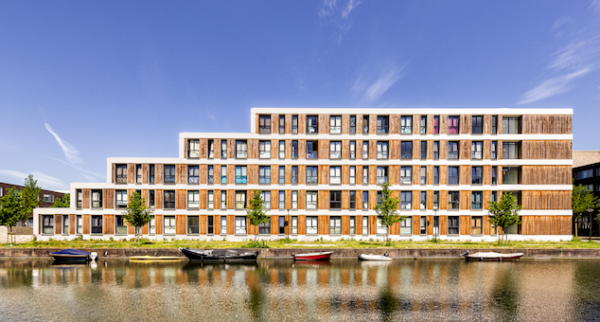
During the past 60 years Daiwa Housing Group has grown into a multi-billion-Pound company that is active throughout Asia, North America and Australia. Having recently acquired the Dutch business, Jan Snel Group, which has a well-developed operation in Swansea in Wales, the organisation is now looking to make the most of the opportunities available within the UK and the rest of Europe through Daiwa House Modular Europe, headquartered in The Netherlands and with subsidiaries in Germany, Belgium and UK.
“Daiwa House were understandably keen to tap into the infrastructure that Jan Snel could provide, particularly its various factories across The Netherlands, whilst at the same time bringing its own expertise and financial muscle to make the most of the potential that the housing market in both Europe and the UK is demonstrating.” explains Ben Pemberton who as UK Manager looks after operations from the Swansea site. “The transition last year went very smoothly with the former Jan Snel operation having now been seamlessly incorporated into the wider Daiwa House Modular Europe organisation.”
In order to address the chronic housing shortage within the UK, modular building has been put forward as one possible solution due to the various benefits it can offer in terms of cost, efficiency and safety. With its unrivalled resources and know-how within the sector, Daiwa House Modular Europe looks extremely well placed to play a leading role building the houses that are so desperately needed.
From the perspective of the Swansea operation, there are major plans to increase its scale in terms of staffing and facilities, as Daiwa House looks to put its money where its mouth is. “We currently have around 15 members of staff comprising architects, project managers, quantity surveyors, senior estimators, Revit modellers and commercial managers, and we’re now looking to increase the team,” adds Mr. Pemberton. “We are currently very sales-based, particularly as the manufacturing currently takes place at our sites in The Netherlands, but in the future we’ll have more production facilities in the UK.”
As the need for housing is so severe, Daiwa House’s desire to move into the UK sector is understandable. It is also easy to why modular is so ideally suited to meeting the needs of the marketplace. “There is real potential for our style of housing within the UK drawing on all the knowledge that Jan Snel has accumulated over the years. The result is that we have an excellent range of products that not only offer high quality and robust modular homes with concrete rather than timber flooring, but are also low carbon, something that is increasingly important in the current climate. We’re even able to construct buildings that go up to 12-storeys, meaning we can also operate within the hotel, healthcare and education sectors if required, For the time being, however, our key focus is predominately housing.”
In terms of recent housing projects, Daiwa House Modular Europe constructed two two-bed four-person homes in Coed Darcy, South Wales, its first modular project working with Coastal Housing Group. A combination of steel-framed modular construction and low carbon energy installation, delivered a design that is zero-carbon-ready, meeting both the emerging changes to Approved Documents L and F in both England and Wales, with a view to satisfying the proposed Future Homes Standard for 2025, as well as meeting Welsh Government design standards. The scheme was delivered through the Welsh Government Innovative Housing Programme.

“Coed Darcy has proven to be a really successful project that has delivered on all its low carbon objectives,” outlines Mr. Pemberton. “It is a very different product in comparison to what else is available within the marketplace and despite being modular, it is virtually indistinguishable from a traditionally-built home. It’s been such an impressive project that we’re using it as a prime example of just what we’re able to offer.
“The energy efficiency of the buildings are just one of the advantages of our modular approach, as the way in which they are constructed is also much safer than traditional methods of construction. Because so much of the process is conducted in a highly controlled environment, the potential for accidents is significantly reduced. This is crucial as the most important aspect of all our projects – from start to finish – is health and safety. There are also less concerns regarding external factors, such as the weather, so we are also able to operate much more efficiently.”
Having got off to such a successful start within the UK with the Coed Darcy project, Daiwa House Modular Europe is now keen to keep the momentum going with plans to develop its own manufacturing facilities in the UK. These will help the business to maximise the opportunities that are currently being seen across the UK and Ireland.
“It’s still relatively early days but I’ve been really impressed with the level of support and commitment that Daiwa House have provided already. There are clear plans to grow the team further and expand our facilities so that we can take on larger housing schemes, some of which we’re already in negotiations for. From a technical point of view, we are in the process of standardising our housing designs across the board and are creating a new residential brochure to outline the options we have available. We’ll also be attending various conferences to further highlight what we can offer and the benefits that our systems provide.”
With further investment in its staff and operation on the horizon, it is clear that Daiwa House Modular Europe is gearing up to become a leading operator within the UK modular housing marketplace at a time when it is needed most.

